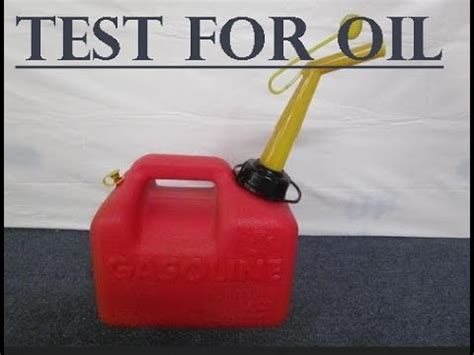How To Tell If Gas Is Mixed With Oil
Ronan Farrow
Apr 02, 2025 · 3 min read

Table of Contents
How to Tell if Gas is Mixed with Oil: A Comprehensive Guide
Finding gas mixed with oil in your car is a serious issue that requires immediate attention. Ignoring it can lead to significant engine damage and costly repairs. This guide will walk you through the signs, causes, and what to do if you suspect gas contamination in your engine oil.
Common Signs of Gas in Your Oil
Several indicators can point to gas contamination in your engine oil. Learning to recognize these signs early is crucial for preventing more extensive damage.
1. Smell the Oil:
This is perhaps the easiest and most immediate test. Check your dipstick. Does the oil smell strongly of gasoline or fuel? A faint smell might be normal due to combustion byproducts, but a strong, pungent gasoline odor is a clear warning sign.
2. Check the Oil Level:
Is the oil level significantly higher than usual? Gas is lighter than oil, and if a significant amount has mixed in, you'll notice a noticeably higher reading on your dipstick.
3. Examine the Oil's Appearance:
While engine oil usually has a dark brown or black hue, gasoline contamination can make it appear thinner, lighter in color (sometimes even reddish), or more translucent. The oil might also appear more bubbly or foamy.
4. Observe Engine Performance:
Gas in the oil can affect how your engine runs. Look for symptoms like:
- Rough idling: The engine may run rough, especially at idle.
- Reduced power: You might experience a noticeable loss of engine power or acceleration.
- Misfires: The engine might misfire, leading to rough running and potentially causing damage to the engine's components.
- Increased exhaust smoke: The exhaust might produce excessive smoke, which can be white or bluish in color.
5. White Smoke from Exhaust: This is a significant sign that something is wrong, and gas contamination in oil could be a culprit. White smoke usually indicates combustion of something other than fuel, and in this case, it could point to the combustion of gas that has seeped into the engine's cylinders.
Causes of Gas in Engine Oil
Understanding the why is just as important as knowing the what. Here are some common culprits:
- Faulty Fuel Injectors: Leaky or malfunctioning fuel injectors can spray fuel directly into the engine's cylinders or into the crankcase, leading to fuel mixing with the oil.
- Damaged Fuel Pump: A problematic fuel pump might cause excessive fuel pressure, leading to fuel leaks into the engine's oil system.
- Cracked or Damaged Fuel Lines: Leaks in fuel lines can allow fuel to escape and contaminate the engine oil.
- Failed PCV Valve: A broken positive crankcase ventilation (PCV) valve can create a vacuum that pulls fuel vapors into the crankcase.
- A Blown Head Gasket: This is a severe issue where the head gasket separating the engine block from the cylinder head fails, allowing coolant and/or fuel to mix with the engine oil.
What to Do if You Suspect Gas in Your Oil
If you suspect gas contamination in your engine oil, immediately stop driving your vehicle. Continuing to drive with gas-contaminated oil can cause catastrophic engine damage.
- Have the Vehicle Inspected: Take your car to a qualified mechanic for a thorough inspection and diagnosis. They will be able to pinpoint the source of the contamination and recommend the necessary repairs.
- Oil Change is Crucial: The mechanic will likely perform an oil change to remove the contaminated oil and replace it with fresh oil and a new oil filter.
- Address the Underlying Issue: The mechanic will identify and fix the root cause of the gas contamination—whether it's a faulty fuel injector, a cracked fuel line, or a more serious problem like a blown head gasket.
Ignoring gas in your engine oil can result in substantial damage and costly repairs. Early detection and prompt action are key to preventing further complications. Always consult a qualified mechanic for diagnosis and repair.
Featured Posts
Also read the following articles
| Article Title | Date |
|---|---|
| How To Replace Carpet In A Camper | Apr 02, 2025 |
| How To Remove Domestic Violence Charges From Record | Apr 02, 2025 |
| How To Store Pool For Winter | Apr 02, 2025 |
| How To Tell If Rv Battery Is Bad | Apr 02, 2025 |
| How To Trim A Pontoon Boat | Apr 02, 2025 |
Latest Posts
-
How Can Remembering Names Improve Your Social Skills
Apr 03, 2025
-
How Can I Watch The Orioles Without Masn
Apr 03, 2025
-
How Can I Watch Chive Tv
Apr 03, 2025
-
How Can I Volunteer In Gaza
Apr 03, 2025
-
How Can I Sue Equifax
Apr 03, 2025
Thank you for visiting our website which covers about How To Tell If Gas Is Mixed With Oil . We hope the information provided has been useful to you. Feel free to contact us if you have any questions or need further assistance. See you next time and don't miss to bookmark.
